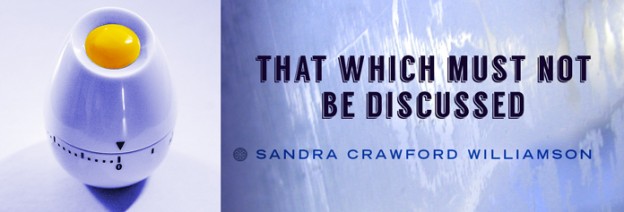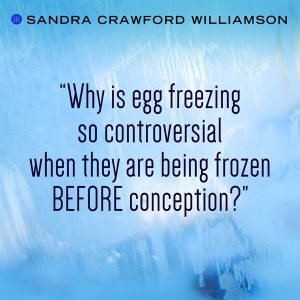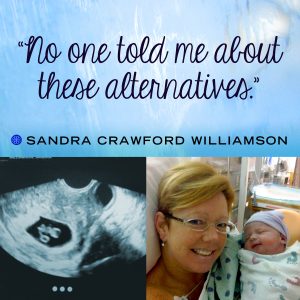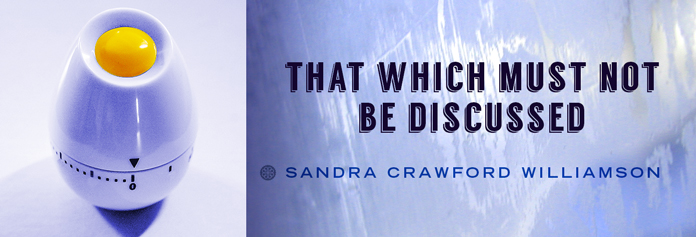
That Which Must Not Be Discussed
How many of us created a list of New Year’s Resolutions for 2015? What was included on those lists? For some, finding a new job might be high on the list. For others, maybe finding an organization with which to volunteer or committing to connecting with a small group at your church made the cut.
And for some of us, an entirely different thought might have crossed our minds: starting our family. Is 2015 the year you think about getting pregnant? Is this the year that you consider utilizing a fertility specialist to help finally make your dream of becoming parents come true? Or did the thought of starting a family make you shake your head and think, “Maybe next year…”
I had many of those years. But I was single and very into my career and was not prepared to settle down. In fact, I found it very hard to even date. Have you ever considered what you might do if the option to have a baby physically isn’t an option next year? I knew I wanted children. I can remember flying home from business in Hong Kong and there being 30 or so new moms who had just adopted Chinese baby girls on the flight. It was chaos, so I would go from aisle to aisle and hold the babies to give the mom a break. More than once I thought, “If I run out of biological time, I will adopt a baby and we would be an awesome pair.”
Well, God had different plans. I married at 36 and at 38 had my first child so easily that I honestly thought all of those awful statistics about how fertility goes down so drastically after  35 were just scare tactics. And then we suffered years of infertility, IUIs, IVFs, four miscarriages and saw the reality of those statistics. I SO wish I had known my options during my peak fertility years. While I was actively pursuing a steadily climbing career in the corporate world, I had no idea that my chances of getting pregnant and successfully carrying a pregnancy dwindled every year, and that I almost lost out on the three beautiful children I have today.
35 were just scare tactics. And then we suffered years of infertility, IUIs, IVFs, four miscarriages and saw the reality of those statistics. I SO wish I had known my options during my peak fertility years. While I was actively pursuing a steadily climbing career in the corporate world, I had no idea that my chances of getting pregnant and successfully carrying a pregnancy dwindled every year, and that I almost lost out on the three beautiful children I have today.
At NO point did my gynecologists in various cities try to educate me on my options or to speak reality to me. At NO point did other women come alongside me and tell me the harsh stories of infertility after a certain age. My family would never have brought it up. I just sailed along, blissfully ignorant, thinking everything would be OK and it would happen when I was ready. UGH how clueless I was.
A few months ago, Apple and Facebook announced that they would provide their female employees the opportunity to use egg freezing as part of their health plan benefits. While this received mixed reviews from the public, it made me wonder why I hadn’t considered this and what using egg freezing might have meant for me. I wish someone had had the courage to tell me, “Don’t wait too late. Freeze your eggs. Your career will be there afterwards.” But no one did. I never even knew that was an option.
My journey to motherhood was physically and emotionally exhausting and came with a lot of heartache and expense. It is my hope to spare anyone else from that experience if egg freezing is the right option for them. So if you’re part of the group of professional women who want children in the future but want to focus on building your career right now, haven’t found the right guy, or any other reason, here is some information on egg freezing and how it might benefit you.
What is egg freezing?
According to WebMD, a process called “…vitrification uses ultra-rapid cooling that is not true freezing, but causes less damage to the egg than actual freezing…” Even though egg freezing was first introduced in 1986, only recently has it become more common. Doctors advise that women considering egg freezing should have the procedure done before the age of 35, as their bodies will yield more eggs with the procedure than those ages 35 and older.
What is the egg freezing process?
After consulting with your doctor, you will begin taking fertility drugs to increase your body’s production of mature eggs. This step, called ovarian stimulation, assists your body in producing 20-25 eggs per month, instead of the single egg that your body would normally produce.
 Once your doctor feels it’s time to begin harvesting your eggs, you will undergo a retrieval procedure that involves your doctor using an ultrasound probe to maneuver a needle into your ovaries to collect any mature eggs that have gathered there. You are under sedation for this procedure, so it is virtually painless on your part.
Once your doctor feels it’s time to begin harvesting your eggs, you will undergo a retrieval procedure that involves your doctor using an ultrasound probe to maneuver a needle into your ovaries to collect any mature eggs that have gathered there. You are under sedation for this procedure, so it is virtually painless on your part.
All of THESE steps are the same ones a woman who is undergoing in vitro fertilization would take. From here, the process is different. With egg freezing, after the mature eggs have been harvested, they are immediately frozen and stored. When you are ready to start having children, your doctor will thaw your eggs and you will then go through the rest of the steps of IVF.
Your doctor will mix your eggs with sperm to create embryos, and then implant them in either you or your surrogate, if you choose to use one. Some women may have 20 eggs successfully retrieved, then after they are mixed with the sperm, maybe six of them will actually fertilize. Every doctor and women is unique, and the decision on how many embryos to implant is a tough one. No matter what your decision is, there are sometimes embryos that are not implanted on the first round that are then frozen and used for future IVF rounds. We NEVER wanted to leave any “eskimos” so we made sure to implant all of our embryos.
Big difference in eggs and embryos!
While there are many opinions in and out of the church about these options, for me it was easy. I believe life begins at conception. I have been pregnant seven times, lost four babies, seen over 100 ultrasounds at all points in a pregnancy. I was always shocked that at only a few weeks after fertilization, there is a heartbeat and you can see armbuds and eyes shortly after.
So one must understand there is a big difference in an EGG, which is the UNfertilized part from a women BEFORE conception and EMBRYOS, which are after conception as cells begin to divide after a successful fertilization with the sperm. The point is that some don’t consider egg freezing because they are against destroying embryos. Please know that one does NOT have to lead to the other.
 How all of these precious situations are handled is a very personal thing. We never wanted to leave any embryos and would NEVER have considered destroying them, but if a couple is blessed to have embryos they do not plan to implant, there is a process where other couples who cannot get to this stage for various reasons (chemo has caused sperm count to be too low, egg retrieval is not an option because of various reasons, etc.) can adopt the embryos.
How all of these precious situations are handled is a very personal thing. We never wanted to leave any embryos and would NEVER have considered destroying them, but if a couple is blessed to have embryos they do not plan to implant, there is a process where other couples who cannot get to this stage for various reasons (chemo has caused sperm count to be too low, egg retrieval is not an option because of various reasons, etc.) can adopt the embryos.
There is a HUGE leap that egg freezing causes destruction of embryos. There are many women who pray for ONE healthy embryo to implant and having extra would mean the possibility of more than one child.
How much does egg freezing cost?
While every doctor and facility’s costs will vary depending on the state, egg freezing will cost anywhere between $7,000 and $15,000. The medications needed for the ovarian stimulation will cost an additional $2,000 to $6,000, and there is a yearly storage fee for the frozen eggs of about $500 a year. Check with your insurance provider to see if they will cover part or all of the egg freezing procedure. If you are diagnosed with cancer and choose to undergo the procedure before treatment, the cost of egg freezing may be lower.
The purpose here is to simply raise the awareness because there are many of us that wish we had known about egg freezing years ago. While I was focused on planning my next career move, I could have also been planning for my future in regards to children. If children are not in the cards for you this year (or the next!), consider the information above and talk with your doctor to find out what your options are.
